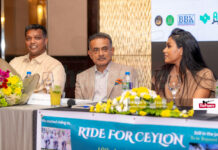A few members of ThePapare.com team had the good fortune to sit down and chat with the legendary All Blacks coach Graham Henry and pick his brain on his successful career.
The enigma that is Graham Henry was born on the 8th of June 1946 to parents Allen and Ann Henry in Christchurch New Zealand.
From a young age Henry found himself interested in Rugby and Cricket. He represented the Christchurch Boy’s School 1st XV in rugby playing at fist-five and was a wicket-keeper batsman in the school’s 1st XI cricket team. He went on to play cricket at a provincial level for Canterbury alongside the great Sir Richard Hadlee. Henry earned a Diploma in Physical Education from the University of Otago in Dunedin and then moved back to attend Teachers College in Christchurch. He then began his career as a teacher at his alma mater, after which he found himself teaching in Auckland. He eventually took on the role of Rugby coach at Auckland Grammar School and was later the Head Master at this prestigious School.
Henry coached the Auckland Grammar school for six years and in that time the school faced just seven defeats.“You need to love the sport, a young coach has to have a lot of passion for rugby and you have to work hard. As a coach you are never the finished product, you are always learning and always trying to get better.” An excerpt from Henry’s book ‘Final Word’ where his advice to coaches is “not to worry about defeat: hate it, but adopt the positive, push-out-the-boundaries, take them on culture. Always control your own environment.”
His exceptional record earned him the opportunity to coach the Auckland Rugby Union’s provincial team. Henry’s Auckland team dominated New Zealand rugby for almost a decade winning every championship and trophy on offer. The likes of Grant Fox, Zinzan Brooke, Pat Lam, Sean Fitzpatrick and Carlos Spencer were a few of the players groomed by Henry at Auckland. Henry went on to coach the Auckland Blues where he maintained a win record of 82%. He also coached the New Zealand A Team before making the jump to coaching at the highest level of International Rugby when he began coaching Wales. Whilst coaching Wales, Henry was given the signal honour of becoming the first-ever Kiwi to coach the British and Irish Lions in 2001. In doing so, he also became the first person born outside Britain or Ireland to coach the legendary Lions. In 2004 Henry realised his dream of coaching his own nation’s team, the New Zealand All Blacks where he reached heights never reached before.
Henry began his dominant career in the amateur era and played an indirect role as a coach in the development of the professional era. When ThePapare asked him how Sri Lanka can catch up with the rest of the world Henry replied “Now the sevens game is an Olympic sport, Sri Lanka has a great opportunity in sevens. Sri Lankan players have the athleticism to play sevens. With good coaches Sri Lanka can go to high places as long as politics are left out. Players must be selected on merit and merit only”.

When Henry took over as coach of Wales, the team was in tatters. The Welsh team had just come off a 90 point defeat to South Africa and a horrific Five Nations performance. Ironically South Africa was to be Graham’s first opponent as the coach of Wales. His first game just four months after the 90 point hiding ended with South Africa winning 28 points to 20 with the scores having been level at 20 all with less than 5 minutes to play. Paul Ackford a Welsh Journalist, praising Graham in his post-match article in the Sunday Telegraph wrote, “Any fool can work with quality but only a genius can transform mediocrity.” “Guide me, O thou great Redeemer” was the line many of the Welsh supporters adopted for Henry. In his first Five Nations championship in charge of the Welsh his team got off to a horrendous start, losing to both Scotland and Ireland in the first two games. Once again the “Great Redeemer stepped in and Wales toppled France in Paris for the first time in 27 years. He also led the Welsh to a fantastic 32-31 win over their arch rivals England at Wembley the following week. When we asked Graham what his secret was he said “Self-belief! Making sure the players believed in themselves is key. Also, demanding that they play well. I put a lot of pressure on them to play well and they did”
Under Henry’s regime the Lions toured Australia and did fairly well winning one of the 3 tests against the Wallabies. We went on to ask Graham about his performance as the coach of the Lions. “I didn’t coach the lions well at all. I was very green, I was very inexperienced as a coach and I didn’t coach them well. There were a few issues and I didn’t address them properly.” In his book ‘Final Word’ Henry explains in detail what his short comings were on that tour. His transparency on his short comings shows exactly what kind of man Sir Graham Henry really is; constantly self-critical and certainly not arrogant or blind to his own faults. Surely a man that deservers the praise he has received.
Once Henry moved back to New Zealand and took over the All Blacks he called on the services of Steve Hanson and Wayne Smith as his assistant coaches. Smith and Hanson played a major role in helping Henry achieve his goals as All Blacks coach. “They were my assistant coaches but that’s not how we worked. Shag (Steve Hanson) handled the forwards while Smithy (Wayne Smith) handled the attacking play and I worked on defence whilst overlooking the rest of the areas. We became very tight as a coaching team and I enjoyed their association very much. When I was looking for my assistants I looked for the best in the world and I certainly got them.”
Henry along with Smith and Hanson built what was certainly the best team in the world at the time in their build up to the 2007 World cup. In their 3 and a half years in charge they accumulated a win record of 87% beating every opponent they faced. The All Blacks came into the World cup as stark favourites on the top of their game. This was until the debacle in Cardiff. The number one team was knocked out by France, a team they had beaten with margins of up to 40 and 50 points in the last two years. This was undoubtedly one of the defining moments in Henry’s career. The clearly better team was virtually robbed of its spot in the semi-final by atrocious refereeing. In his game review Henry listed 40 incidents where France should have been penalised and were not. In the entirety of the game France were just penalised twice, ironically France was the most penalised team in the 2007 World Cup. The All Blacks held 72% of the territory and 73% of the possession in the game and still lost 20-18. In Henry’s book he says that had the referring been up to the mark the result should have been around 42-06 in favour of the All Blacks, considering both French tries were controversial. When we questioned Henry on this event “It was a very difficult time, we were good enough to win the World cup in 2007 and it didn’t happen. We learnt lessons from that. Part of being a coach is learning as you go along. Mentally, we were not equipped to handle what took place in Cardiff, so we had to get mentally stronger to handle the unexpected. We had many unexpecteds in that game, we lost players through injury and the referee was difficult.” Henry in his responses never pointed fingers and along with his fellow coaches and his team they took the loss and moved on with pride. Perhaps a lesson for Sri Lankan players and coaches, especially the ones causing all the mayhem in the Schools league at present.
Henry and his coaching staff were the first coaches to be reappointed after losing a world cup. When we asked him about this Henry went on to say “We were reappointed only because Ritchie McCaw and the players wanted us. Had we not had that endorsement it wouldn’t have happened. And that endorsement played a massive role four years later when we won the world cup.”
Over the next four years Henry re-built the best side in the world, once again amassing numerous victories on their way to the World Cup final. In a strange sequence of events Henry’s men were given the opportunity to exact revenge when they faced France in the Final of the 2011 World Cup. The mighty All Blacks under Henry’s guidance won the World Cup for the first time in 24 years. When we asked Henry what he felt when he finally achieved his dream he replied “You feel peace and relief! We’ve finally won”
Finally what is next for the great Sir Graham Henry? “I’ve coached over 140 tests, I’ve coached Wales the Lions and the All Blacks…. Now it’s time to retire. I’ve been married to my wife for 40 years, I have a 97 year old mother, Children and Grandchildren so it’s time to move on. I will always be a part of Rugby and it will always be a part of me. I’m in an advisory role with the Blues and with Argentina but nothing serious. I enjoy coaching and I will always be involved. I can now spend holidays in places like Sri Lanka, Maldives, Cambodia and Vietnam with my wife. Its family time now”
Grahams coaching record
| Team | Played | Won | Lost | Drawn | Success Rate |
| Auckland Grammar | 102 | 95 | 7 | 0 | 93% |
| Auckland University | 98 | 79 | 17 | 2 | 81% |
| NZ Secondary Schools | 19 | 17 | 2 | 0 | 89% |
| Auckland Colts | 40 | 39 | 1 | 0 | 98% |
| Auckland B | 9 | 6 | 2 | 1 | 67% |
| Auckland | 102 | 80 | 22 | 0 | 78% |
| New Zealand A | 3 | 3 | 0 | 0 | 100% |
| Wales | 34 | 20 | 13 | 1 | 59% |
| British Lions | 10 | 7 | 3 | 0 | 70% |
| All Blacks | 106 | 90 | 16 | 0 | 85% |
| Totals | 562 | 468 | 89 | 5 | 83% |
In the epilogue of Graham’s book ‘Final Word’ Ritchie McCaw states “Graham has been a terrific coach for the All Blacks. As a player you couldn’t have asked for anything more in a coach. The more you get to know him, the better you come to appreciate him.”
Courtesy to Bob Howitt the Author of Sir Graham Henry’s autobiography ‘Final Word’. Many of the stats, facts and quotations are from this book.
ThePapare.com is overwhelmed at the privilege afforded to them by the great Sir Graham Henry in allowing us this exclusive. Thank you Sir. Our intrusion was on his holiday and so we did the utmost to keep it short even though the questions were a plenty. We believe that it is impossible to have done justice to the legend in this piece, but we humbly say ‘we tried’.
A heartfelt thank you to Dilmah Tea, for making it possible to arrange the interview all the way up in Radella.














